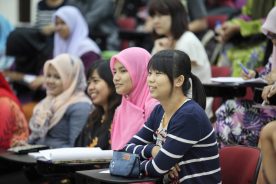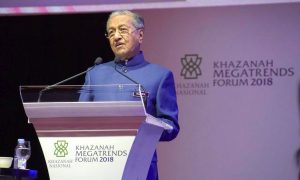On 4 May 2019, an infographic in Malay titled “The PH Government Empowers Women” surfaced and made the rounds on social media. With the captions, “More women leaders in Cabinet” and “More women assigned for the first time to highest leadership positions in government agencies, GLCs and GLICs”, it featured 16 women who occupied top decision-making posts in the country. The next day, an updated infographic appeared, adding another 12 women. In total, besides the five ministers and four deputy ministers appointed under the new Pakatan Harapan (PH) government, women now headed the judiciary, the parliamentary Public Accounts Committee, as well as 17 major government and government-related entities.[1]
After one year of PH rule, far more women are now key decision-makers than under the Barisan Nasional (BN) administration. This growth is laudable given the importance of the expertise and experience these women bring to the governing of Malaysia. Equally significant is the message their appointments sent out to the general public—that contrary to what naysayers may believe, women can be just as accomplished as men. As role models, such visible women also help challenge gender stereotypes that reinforce misconceptions that all men are rational, smart, and strong, and hence natural leaders whilst all women are emotional, obedient and weak, and therefore best suited to being followers.
Promoting more women leaders was in fact one of five commitments that PH had made to women in its 14th General Election (GE14) manifesto, but it was not the main one. The manifesto gave priority instead to a seemingly random goal of ensuring that women, specifically housewives, had access to social security via a savings scheme run by the Employees Provident Fund (EPF). This was made part of the “Ten Promises in 100 Days” pledge that PH used to garner voter support during the election campaign period. PH initially proposed deducting 2% of a husband’s monthly EPF contribution and channelling this to his spouse, a housewife. The government would then supplement this amount with a maximum of RM50 each month. This way, a housewife could expect to have some kind of financial safety net in the event of her husband’s death or abandonment.
By the time this scheme—called “i-Suri” (suri or housewife incentive)—kicked off in August 2018, its scope and method of operationalisation had been refined. It was to target women from the poorest communities, in particular, housewives, widows, and single mothers from the approximately 360,000 households registered with e-Kasih,[2] and only Malaysian citizens under 60 years old could apply. The scheme was also to be implemented gradually, in three phases.
The first phase ran from mid-August through December 2018 and obliged successful applicants to save a minimum of RM5 with EPF each month. In return, the government pitched in up to RM40 monthly, or a maximum of RM200 during this time. The second phase involved getting enough women from the e-Kasih database to join i-Suri to reach a targeted 100,000 account holders by mid-2019. The government also raised its monthly contribution to RM50, with the additional RM10 going into the Social Security Organisation to extend further protection to these housewives. The allocation for 2019 was capped at RM480 per i-Suri recipient. The original idea to have husbands redirect 2% of their EPF contributions to their wives’ accounts is scheduled for enforcement only in the third phase, possibly the third quarter of 2020, after the Employees Provident Fund Act 1991 has been amended. Until then, current rules make it unlawful for an individual’s EPF savings to be transferred to another’s account, as required in the i-Suri scheme.
Teething problems aside,[3] it is noteworthy that underlying i-Suri’s intent is an official recognition of the contribution of housewives towards their families and the country’s development. According to the Deputy Prime Minister, also the Women’s Minister, they are the “unsung heroes” whom the scheme sought to reward by safeguarding their long-term wellbeing. This proposal, however, was not new. EPF first mooted a similar idea in 2005 before setting up the 1Malaysia Retirement Scheme (SP1M) in 2010, allowing those in the informal economy, including housewives, to make voluntary payments.[4] Different and commendable is PH’s concerted effort to promote the i-Suri scheme and to actively enlist housewives from the poorest communities as members. After all, how often have government initiatives that seek to improve the lives of the rakyat been compromised due to inadequate publicity and reach?
Not everyone welcomed what was perceived as a mandatory scheme for husbands to compensate housewife-spouses for their labour. The loudest critics argued that the scheme would unfairly burden men, particularly those from lower income groups. It is too early to speculate if this will be the outcome of i-Suri, particularly because little evidence has been forwarded to support this claim. Nevertheless, the scheme’s current emphasis on women in the e-Kasih database, the extreme poor, does mean that rather than benevolent husbands, it is more likely that women themselves will be the predominant contributors. Also, in the first two phases of i-Suri, the bulk of payments have come from the government, which has set aside RM65 million—first RM20 million, then another RM45 million—to ensure the scheme works.
It is still unclear what will happen under phase three, when i-Suri’s raison d’être—getting husbands to pay wives for the domestic and reproductive work they perform—kicks in and shows demonstrable impact. Presumably this is when i-Suri will be extended to all housewives, not just those extremely poor, but also others from the B40 category (with monthly household income of under RM3,860) who are currently excluded from the scheme, as well as those in the lower-income tiers of the M40 category (with monthly household income of under RM8,319). A larger question is not whether husbands will be compelled to contribute an additional 2% of their income to their wives’ EPF accounts, over and above the current 11% requirement—the government has made it clear that they will not need to do so—but whether men will contribute anything at all, since this scheme is entirely voluntary.
Understandably the shift towards getting husbands to willingly pay their housewife-spouses for their labour will take time, since doing so involves addressing deep-rooted structural barriers to gender equality. Any opposition to i-Suri is probably less about husbands’ surrendering 2% of their EPF contributions—as others have pointed out, the amount is paltry and barely reflective of the true value of the work housewives perform[5]—and more about the expectation that such work, more commonly known as care work, is primarily a woman’s job that should be performed for free. This long-held view and expectation stems from gender norms rooted in entrenched stereotypes about the roles and attributes of women and men alike. It continues even though the notion that “men are breadwinners, and women are housewives” has long been debunked and is not the reality of many across the globe today, including in Malaysia.
Such stereotypical thinking about gender roles is counter to the worldwide trend that recognises how unpaid care work—defined here as housework (cooking, cleaning, laundry); looking after children, sick or older family members; and managing a household—is crucial in making possible “productive” work, or paid employment in the market economy. Care work, also termed “reproductive” work, is what enables husbands to “go to work” and add to a nation’s economic growth. Children’s upbringing in particular has a direct bearing on crime rates and collective happiness. Care work is thus fundamental in maintaining societal wellbeing and in raising living standards. Yet this work is taken for granted because the economy, with its utilitarian emphasis on making money, is shaped by male benchmarks.
Because care work is seen as women’s work, in the event that both spouses have full-time employment outside the home, these functions overwhelmingly fall on the shoulders of other women: female relatives or migrant or unskilled local female domestic workers. Socially and economically invisible, they are either unpaid or underpaid, and in the case of the latter, legally denied the compensation and benefits extended to other workers in this country.
To prevent the i-Suri scheme from coming to a premature demise, the government needs an approach that supports the effective implementation of this policy for housewives. How will foot-dragging husbands be convinced to pay their wives for the critically important work they do at home if nothing is done to reverse how society views care work? Central to change are institutionalised measures that help to dismantle gender stereotypes that burden women with the major responsibility of care work, and that causes their domestic labour to be unappreciated and undervalued.
Such measures could be as straightforward as providing teachers with gender training and introducing gender modules into the education curriculum—coincidentally, one of PH’s other promises in the run-up to GE14. Removing textbook references that perpetuate gender stereotypes and replacing these with content that reflects the diversity and reality of the many roles women and men can and do perform would likewise help. Beyond school-based remedies, national time-use surveys and research to measure the worth of care work can go a long way not just to convince sceptics, but also to raise the possibility of this unpaid work’s being included in macro-policy deliberations rather than remaining invisible.
It is vital, too, that the PH government consider its gender policies holistically and not as discrete endeavours, as is the case now. Take the example of long-standing efforts to woo more women back into the productive workforce, which in turn is fuelled by a belief that increasing the female labour force participation rate can propel the nation’s gross domestic product higher. Despite the appearance of Malaysia’s having successfully raised this figure over time—after years of hovering below the 50% mark, the female labour force participation rate rose from 48% in 2011, to 54% in 2015, to 56% currently—the fact remains that there continues to be a gap of more than 20 percentage points between this rate and the male equivalent. One explanation for this persisting gap is the unequal division of labour in households. As revealed in a study in 2018 by Khazanah Research Institute, 58% of women outside the labour force cited housework and familial responsibilities as the reason for this disparity, compared to only 3.2% of men.
Reforming higher education in Malaysia: combating entrenched patronage and racial politics
Pakatan Harapan had promised academic freedom and institutional autonomy for public universities. Can it—or will it—deliver?
Indeed, achieving greater congruence among the PH government’s gender policies requires, as the corollary to freeing women to leave the home for the formal economy, encouraging and enabling men to step up and take on care work, as well. Offering men flexiwork as an option is a start. So, too, would be extending their duration of paternity leave beyond the seven days applicable in the public sector. Seven days may suffice for a father to witness the birth of a child and to support his partner during and after childbirth, but it is not enough for him to share the load that comes with raising a newborn child. Conceptualising maternity and paternity leave as parental leave, and allocating fathers an adequate share of this can likewise be helpful in dismantling harmful gender norms, especially since these also place limits on men.
In evaluating PH’s efforts to improve women’s lives in its first year of government, one cannot help but notice the similarities between its policy trajectories and those under the previous BN administration. The lack of any notable differences raises questions, not least about the new government’s capacity and intent to do better. Appointing more women to major government posts and offering housewives a chance to enjoy social security are both tangible and positive steps that acknowledge what women are capable of and what they bring to the development of the nation. Even so, these two initiatives can only go so far if not backed by overarching and connected strategies, and the political courage to make much-needed structural change.
 Facebook
Facebook  Twitter
Twitter  Soundcloud
Soundcloud  Youtube
Youtube  Rss
Rss 



